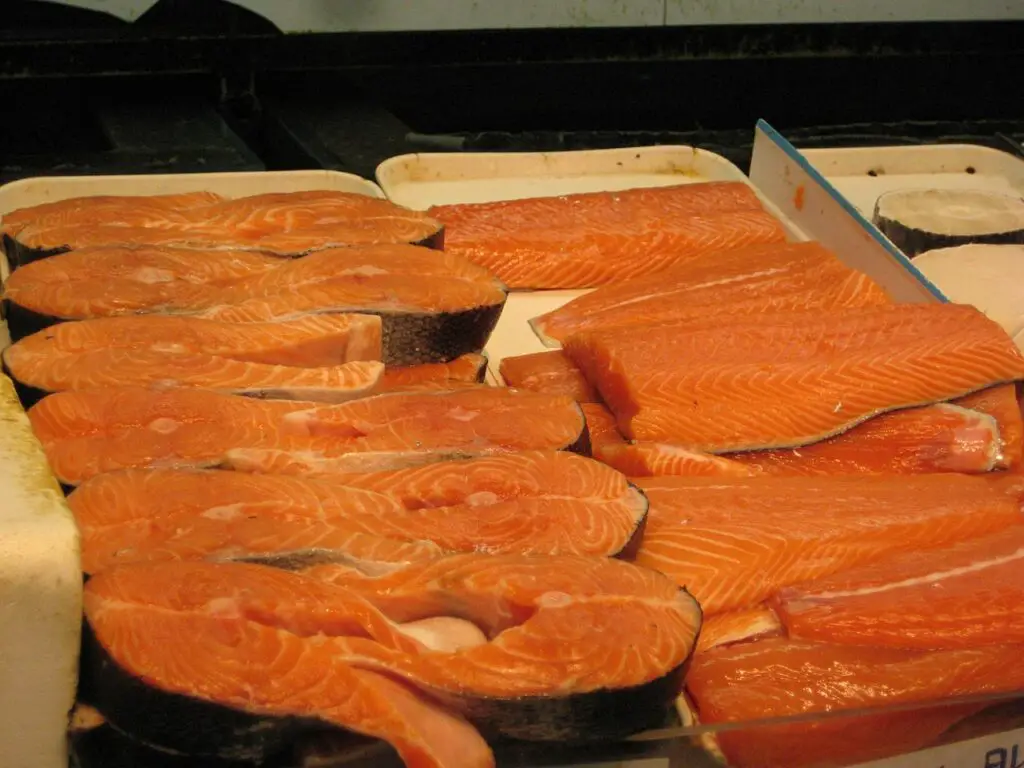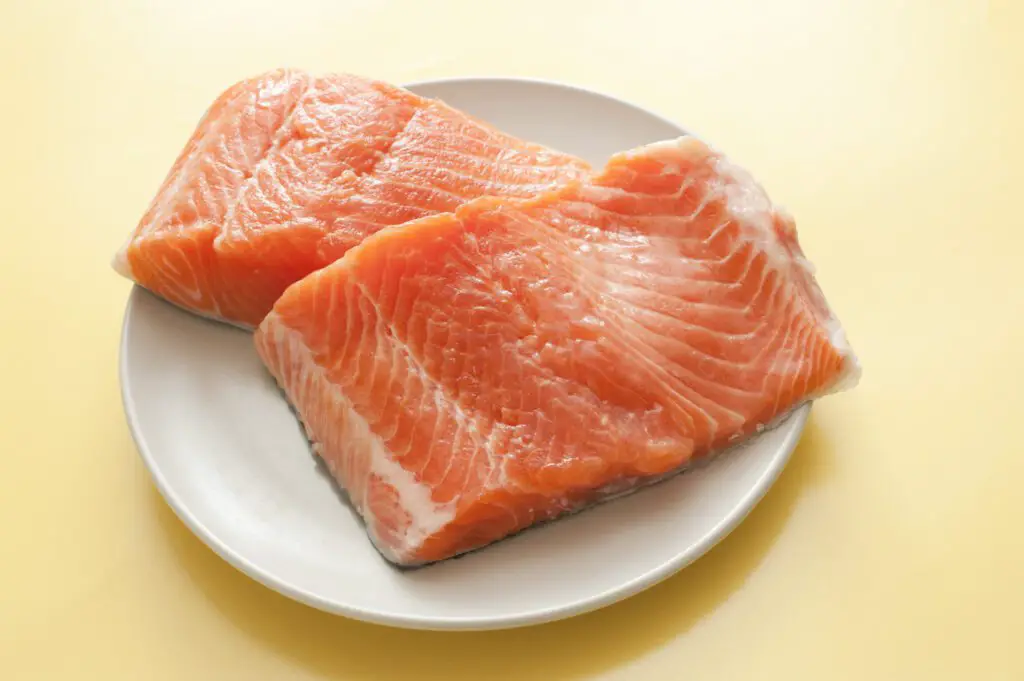Salmon is a popular seafood option that can be beneficial for both humans and pets alike. But the question remains: can dogs eat raw or cooked salmon?
The answer is yes, but there are a few things to consider before feeding your pup any salmon.
Raw salmon may contain parasites, while cooked fish may contain bones that could prove hazardous if ingested. Here’s what you need to know about feeding your pup salmon—raw or cooked.
- Can Dogs Eat Raw or Cooked Salmon?
- How Much Salmon Can Dogs Eat?
- How Often Can Dogs Eat Salmon
- Health Benefits of Salmon To Dogs
- Potential Risks of Feeding Salmon To Dogs
- Nutritional Benefits of Salmon For Dogs
- Are Dogs Sensitive To Salmon?
- How To Prepare Salmon For Dogs
- How Fast Will Dogs Digest Salmon
- FAQs
- In Conclusion
Can Dogs Eat Raw or Cooked Salmon?

Yes, dogs can eat salmon as long as it is cooked. Raw or undercooked salmon can contain parasites and bacteria that can make your pet extremely sick.
It is important to thoroughly cook any salmon before feeding it to your dog.
The internal minimum temperature should reach 145 degrees Fahrenheit according to the USDA. Baking, grilling, and poaching are all safe ways to cook salmon for your pup.
Sushi-grade salmon is an exception to this rule; it is quickly caught, bled, gutted, and iced before consumption which makes it safe for both humans and dogs alike.
However, if you are unsure of the quality of the fish you have purchased, it is best to err on the side of caution and cook the salmon before feeding it to your dog.
Overall, salmon can be a great source of protein for your pup but make sure you always feed them cooked fish!
See also: Top 10 Safe Seafood Options For Dogs To Eat
Can Dogs Eat Raw or Cooked Salmon
How Much Salmon Can Dogs Eat?

The appropriate amount of salmon to give your pup will depend on its size and weight, but a good general rule is no more than 10% of their daily food intake should come from treats.
While salmon can be a great treat for your pup, it should never replace their regular diet. Salmon should always be given in moderation as a supplement or treat.
When introducing salmon into your pup’s diet, start with small amounts as too much can lead to digestive upset.
If you notice any digestive issues after giving your pet salmon, reduce the amount you are feeding them and speak to your veterinarian if problems persist.
Can Dogs Eat Raw or Cooked Salmon
Salmon Feeding Chart According To Size
| Food | Size | Portion |
|---|---|---|
| Salmon | Toy dogs | 2 ounces per day |
| Salmon | Small dogs | 2 ounces per day |
| Salmon | Medium dogs | 4 ounces per day |
| Salmon | Large Dogs | 5 ounces per day |
Salmon Feeding Chart According To Age
| Food | Age | Portion |
|---|---|---|
| Salmon | 0 – 6 months | Don’t feed |
| Salmon | 6 – 12 months | 2 ounces per day |
| Salmon | 12 – 24 months | 4-5 ounces per day |
| Salmon | 24+ months | 4-5 ounces per day |
How Often Can Dogs Eat Salmon
Generally speaking, salmon can be fed to your dog no more than once a day. This will ensure that your pup gets all the nutrients they need without overloading them with too much fat or calories.
Salmon is a great source of protein and omega-3 fatty acids, making it a nutritious option for dogs.
When feeding salmon to your pup, make sure it is cooked thoroughly and free from any bones or skin.
Raw salmon can contain parasites and bacteria, so it’s best to avoid feeding it to your pup altogether. If you are using canned salmon, make sure it is packed in water rather than oil as this will help keep the calorie count down.
If you are unsure about how much salmon to feed your pup, consult with your veterinarian for advice specific to their needs. They may also be able to recommend other sources of omega-3 fatty acids if needed.
Can Dogs Eat Raw or Cooked Salmon
Health Benefits of Salmon To Dogs
- Omega-3 fatty acids. Salmon contains high levels of omega-3 fatty acids, which are beneficial for maintaining healthy skin and coat, reducing inflammation, and promoting better joint health.
- High in protein. Salmon is a good source of protein and provides your pup with all the essential amino acids they need to stay strong and active.
- Rich in minerals. Salmon is rich in minerals such as calcium, magnesium, and potassium which are important for maintaining strong bones and muscles.
- Boosts brain power. Omega-3 fatty acids can also help boost brain power, keeping your pup alert and attentive!
Potential Risks of Feeding Salmon To Dogs
- Parasite contamination. Raw or undercooked salmon can contain parasites that can be harmful to your pup’s health. Make sure the salmon you feed to your pup is cooked thoroughly.
- Bones. Canned salmon may contain small bones, so make sure you check for them before feeding it to your pup as they can cause choking hazards or internal blockages.
- Excessive fat. Salmon contains high levels of fat and while this can be beneficial in moderation, too much can lead to obesity and other health issues. Use canned salmon packed in water rather than oil and limit treat sizes to appropriate amounts for your pup’s size.
- Allergies. There is also a risk that your pup could be allergic or have an adverse reaction to consuming salmon, so always observe for any signs of allergy such as skin rashes or vomiting after eating it.
Nutritional Benefits of Salmon For Dogs
| Salmon Nutrition Facts per 100 grams | % DV * |
|---|---|
| Calories | 208 |
| Total Fat | 13 g |
| Cholesterol | 55 mg |
| Sugar | 0 g |
| Glycemic Index | 0 |
| Sodium | 59 mg |
| Carbs | 0 g |
| Protein | 20 g |
| Vitamin D | 0% |
| Calcium | 0% |
| Iron | 1% |
| Potassium | 363 mg |
Can Dogs Eat Raw or Cooked Salmon
Are Dogs Sensitive To Salmon?
Yes, dogs can be sensitive to salmon, but it depends on the individual dog. Some dogs may be allergic to salmon, while others may not have any adverse reactions.
Fish allergies in dogs are not as common as other food allergies, but they can still occur. Symptoms of a fish allergy in dogs can include ear infections, diarrhea, fur loss, skin infections, itchy skin, hives, and vomiting.
If you suspect your dog has a fish allergy, it is important to discuss this with your veterinarian. They will be able to help you identify the cause and recommend the best course of action for treating your dog’s symptoms.
In general, it is best to avoid feeding your dog raw fish or fish from the salmon family (e.g., trout and whitefish). These types of fish may contain parasites that can be harmful to dogs. Additionally, if your dog does have a fish allergy, you should avoid feeding them any type of fish-based food.
How To Prepare Salmon For Dogs
- Boiling. Boiling is a simple and safe way to cook salmon for your pup. Start by adding a cup of water to a pot and bring it to a boil. Place the salmon in the boiling water and turn down the heat, simmering for 10 minutes or until cooked through. Let the salmon cool before serving it to your pup.
- Grilling. Grilled salmon is another great option for dog-friendly fish dishes. To grill, season the salmon with salt and pepper and brush both sides with oil. Grill over medium-high heat for 7-10 minutes, flipping once halfway through. Once grilled, let cool before feeding your pup.
- Canned. Canned salmon is an easy option for making pup-friendly fish meals. Make sure to check that the label does not indicate any added oils or ingredients that could be harmful to your pet and look out for small bones that may have been missed during processing which can cause choking hazards or internal blockages when consumed.
How Fast Will Dogs Digest Salmon
Dogs will typically digest salmon within 4-6 hours. The speed of digestion is determined by the size of the meal, how well it is cooked, and the individual dog’s metabolism.
Generally, if your dog has eaten a moderate amount of salmon that is adequately cooked, it should take between 4-6 hours for them to fully process and digest it.
FAQs
Are there any specific types of salmon that are better for dogs to eat?
- Wild-Caught. Wild-caught salmon is a great option for dogs as it is free from added hormones, antibiotics, and other chemicals. It also contains important omega-3 fatty acids which help to keep their coat and skin healthy.
- Farmed Atlantic. Farmed Atlantic salmon is another good choice for pet owners who want to give their pup something nutritious and tasty. Farmed Atlantic salmon contains rich levels of omega-3 fatty acids which can be beneficial for overall health in dogs.
- Smoked. Smoked salmon can make a great dog treat if it is served in moderation. Smoked salmon should not be given frequently due to the smoke flavoring but can make a nice occasional snack that is filled with healthy fats and protein.
Can Puppies Eat Salmon?
Yes, puppies can eat salmon in moderation. Salmon is a healthy source of protein and omega-3 fatty acids, which can help with your dog’s coat and skin health.
However, it is important to feed puppies salmon that has been cooked thoroughly to kill off any potential bacteria or parasites. It is also best to start with smaller portions when introducing salmon into your puppy’s diet.
In Conclusion
In conclusion, dogs can eat salmon in moderation and as part of a balanced diet. Salmon provides many health benefits for dogs due to its high protein, omega-3 fatty acids, and vitamin D content.
However, it is important to make sure the salmon is cooked thoroughly to avoid the risk of parasites and bacteria.
Additionally, certain types of salmon, such as farmed salmon and those with added flavors or seasonings, may contain harmful additives or chemicals that can be harmful to dogs.
Overall, while salmon can be a healthy addition to a dog’s diet, it is important to consult with a veterinarian before making any significant changes to their diet.
Related article:
- Can Dogs Eat Shrimp? Shell-Yeah!
- Can Dogs Eat Tuna? From The Sea To The Bowl
- Can Dogs Eat Cod? A Nutritious Treat For Your Pooch
- Can Dogs Eat Crab? Don’t Be Shellfish, Share Some With Your Pooch
- Can Dogs Eat Lobster? A Gourmet Treat For Your Pooch
- Can Dogs Eat Mussels? To Mussel or Not To Mussel
- Can Dogs Eat Squid? Squid-tastic Addition To Your Dog’s Diet
- Can Dogs Eat Scallops? Paws Up or Paws Down?
- Can Dogs Eat Sardines? Tiny Fish, Big Impact





Leave a Reply